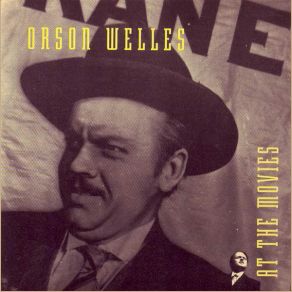At the Movies: Orson Welles
Download links and information about At the Movies: Orson Welles by Bernard Herrmann. This album was released in 1989 and it belongs to Orchestral, World Music, Theatre/Soundtrack, Orchestral genres. It contains 29 tracks with total duration of 01:18:01 minutes.

|
|
|---|---|
| Artist: | Bernard Herrmann |
| Release date: | 1989 |
| Genre: | Orchestral, World Music, Theatre/Soundtrack, Orchestral |
| Tracks: | 29 |
| Duration: | 01:18:01 |
| Buy it NOW at: | |
| Buy on iTunes $5.99 | |
Tracks
[Edit]| No. | Title | Length |
|---|---|---|
| 1. | Citizen Kane: Prelude (featuring Australian Philharmonic Orchestra) | 2:20 |
| 2. | Citizen Kane: Thatcher Library (Litany) / Ms. Reading & Snow Picture / Mother's Sacrifice / Charlie Meets Thatcher (featuring Australian Philharmonic Orchestra) | 3:24 |
| 3. | Citizen Kane: Dissolve to Thatcher / Second Ms. / Bernstein's Narration (featuring Australian Philharmonic Orchestra) | 1:42 |
| 4. | Citizen Kane: Kane's News Office / Carter's Exit / Chronicle Scherzo (featuring Australian Philharmonic Orchestra) | 2:59 |
| 5. | Citizen Kane: Kane's Return / Valse Presentation (featuring Australian Philharmonic Orchestra) | 1:41 |
| 6. | Citizen Kane: Sunset Narrative (featuring Australian Philharmonic Orchestra) | 2:20 |
| 7. | Citizen Kane: Theme and Variations (Breakfast Montage) (featuring Australian Philharmonic Orchestra) | 3:20 |
| 8. | Citizen Kane: Kane Meets Susan / Susan's Room Mother Memory (featuring Australian Philharmonic Orchestra) | 3:10 |
| 9. | Citizen Kane: The Trip To Susan's / Getty's Departure / Kane Marries (featuring Australian Philharmonic Orchestra) | 2:10 |
| 10. | Citizen Kane: Salaambo's Aria (featuring Australian Philharmonic Orchestra) | 4:22 |
| 11. | Citizen Kane: Opera Montage (featuring Australian Philharmonic Orchestra) | 0:48 |
| 12. | Citizen Kane: Xanadu / Jigsaw Puzzles (Perpetual Motion) / Second Xanadu (featuring Australian Philharmonic Orchestra) | 3:52 |
| 13. | Citizen Kane: Kane's Picnic / Susan Leaves (featuring Australian Philharmonic Orchestra) | 2:00 |
| 14. | Citizen Kane: The Glass Ball (featuring Australian Philharmonic Orchestra) | 1:23 |
| 15. | Citizen Kane: Finale (featuring Australian Philharmonic Orchestra) | 2:35 |
| 16. | The Magnificent Ambersons: Theme & Variations / George's Homecoming (featuring Australian Philharmonic Orchestra) | 7:18 |
| 17. | The Magnificent Ambersons: Snow Ride (featuring Australian Philharmonic Orchestra) | 3:02 |
| 18. | The Magnificent Ambersons: Toccata (featuring Australian Philharmonic Orchestra) | 1:08 |
| 19. | The Magnificent Ambersons: First Nocturne (featuring Australian Philharmonic Orchestra) | 4:05 |
| 20. | The Magnificent Ambersons: Fantasia (featuring Australian Philharmonic Orchestra) | 2:11 |
| 21. | The Magnificent Ambersons: Scene Pathetique (featuring Australian Philharmonic Orchestra) | 2:16 |
| 22. | The Magnificent Ambersons: Ostinato (featuring Australian Philharmonic Orchestra) | 1:52 |
| 23. | The Magnificent Ambersons: First Letter Scene (featuring Australian Philharmonic Orchestra) | 3:25 |
| 24. | The Magnificent Ambersons: Second Letter Scene / Romanza (featuring Australian Philharmonic Orchestra) | 2:12 |
| 25. | The Magnificent Ambersons: Second Nocturne (featuring Australian Philharmonic Orchestra) | 3:18 |
| 26. | The Magnificent Ambersons: First Reverie / Second Reverie (featuring Australian Philharmonic Orchestra) | 2:40 |
| 27. | The Magnificent Ambersons: The Walk Home (featuring Australian Philharmonic Orchestra) | 2:46 |
| 28. | The Magnificent Ambersons: Elegy (featuring Australian Philharmonic Orchestra) | 1:23 |
| 29. | The Magnificent Ambersons: End Title (featuring Australian Philharmonic Orchestra) | 2:19 |
Details
[Edit]This is a fascinating CD, encompassing suites from three scores by Bernard Herrmann that the composer wrote during his period of eclipse from Hollywood, overlooked by the major studios and filmmakers — he barely broke stride, so it seems, authoring the scores for Battle of Neretva, Sisters, and Night Digger all in one two-year period. Battle of Neretva was a strange assignment for the composer, who was brought in to write the music for the English-language edit of the movie (running more than an hour shorter than the original European edit, which had been scored by Dusan Radic) — he employed the largest orchestra of his whole career, and also salvaged elements of his unused score for Torn Curtain as well as reviving parts of his concert work "Souvenirs de Voyage"; one can also hear elements pulled from Jason & the Argonauts, Vertigo, 7th Voyage of Sinbad, and others, and music that would later turn up, in somewhat rewritten form, in Obsession. It's a masterful creation and would dominate almost any compilation on which it appeared — except this one, because it is followed by Herrmann's music for Brian DePalma's Sisters (1973), which literally scared this reviewer hearing it, so unsettling was its mix of strings, bells, vibraphone, winds, and Moog synthesizers. It is some of the scariest music that Herrmann had written since Psycho, and worth the price of the CD. And then there's his music for Night Digger (1971), with its use of the viola d'amore — which Herrmann had employed as a featured solo instrument in his score for On Dangerous Ground — and dense string passages that recall his gothic romantic work on The Ghost and Mrs. Muir. Between the eerie timbral effects, one can also hear musical elements, stings, and swells on the strings that he has salvaged and recomposed from his television work, on The Twilight Zone and elsewhere. It's also well played and nicely mastered, with well-selected index points for the longer pieces, and is as essential listening as Herrmann's better-known, subsequent work on Obsession and Taxi Driver.